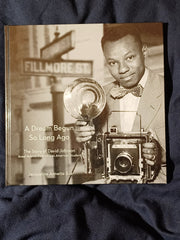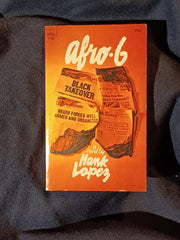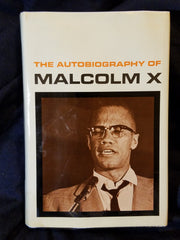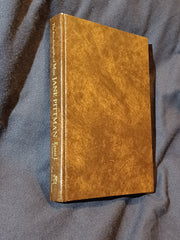Peekskill: USA by Howard Fast. Signed by Fast, Paul Robeson and William L. Patterson
Sold out.
Peekskill: USA, a personal experience by Howard Fast. "This edition of Peekskill: USA has been limited in number to five hundred, specially bound and numbered, and autographed by Howard Fast, Paul Robeson and William L. Patterson". AUTOGRAPHED BY HOWARD FAST, PAUL ROBESON and WILLIAM L. PATTERSON on the half-title page. Published by Civil Rights Congress. 1951. . 127 pages plus 7 pages of photographsHard cover with dust jacket. DUST JACKET: Slight edge wear, but heavy on the corners of the spine. Some surface small abrasions. No missing pieces. No clips or unusual folds. It looks like there is an arrow pointing toward the price on the front flap of the dj that didn't quite take hold from the printing press. There apopears to be a discoloration to the tan colored parts of the dj, more pronounced to the edges of the flaps. A 1/4" inch stain on the front flap of dj. Dj is now covered by a mylar dj protector. BOOK: Light cover edge wear. Bright gilt lettering on spine. Light tanning to endpapers and edges of the page block. The number "226" written descretely in blue ball point pen on the first blank page. This could be the number printed of the 500 copies. About a 1/2" water? stain on the top edge of the page block. A pin head sized stain on the leadingedge of the page block. Light foxing? on and near the bottom tip of the page block. A light pencil sentence on the last blank page. Otherwise no previous owner markings. No folds, creases or tears to pages. Binding is tight with no looseness to pages. Not ex-library, not remaindered, not a facsimile reprint. For sale by Jon Wobber, bookseller since 1978. CH10a
"The Peekskill riots were anti-communist riots with anti-black and anti-Semitic undertones that took place at Cortlandt Manor, Westchester County, New York, in 1949. The catalyst for the rioting was an announced concert by black singer Paul Robeson, who was well known for his strong pro-trade union stance, civil rights activism, communist affiliations, and anti-colonialism. The concert, organized as a benefit for the Civil Rights Congress, was scheduled to take place on August 27 in Lakeland Acres, just north of Peekskill.
Robeson had given three earlier concerts in Peekskill without incident, but in recent years Robeson had been increasingly vocal against the Ku Klux Klan and other forces of white supremacy, both domestically and internationally. Robeson specifically made a transformation from someone who was primarily a singer into a political persona with a vocal support for what were at the time considered "communist" causes, including the decolonization of Africa, anti-Jim Crow legislation, and peace with the USSR.[4] Robeson had also appeared before the House Committee on Un-American Activities to oppose a bill that would require communists to register as foreign agents and, just months before the concerts in 1949, he had appeared at the Soviet-sponsored World Peace Conference in Paris. Referring to the growing tensions between the USA and the USSR, he stated:
We in America do not forget that it was the backs of white workers from Europe and on the backs of millions of Blacks that the wealth of America was built. And we are resolved to share it equally. We reject any hysterical raving that urges us to make war on anyone. Our will to fight for peace is strong...We shall support peace and friendship among all nations, with Soviet Russia and the People's Republics."
What came over the wires to news agencies via the AP in the United States was as follows,
We colonial peoples have contributed to the building of the United States and are determined to share its wealth. We denounce the policy of the United States government which is similar to Hitler and Goebbels.... It is unthinkable that American Negros would go to war on behalf of those who have oppressed us for generations against the Soviet Union which in one generation has lifted our people to full human dignity." - Wikipedia
"Here for the first time is a full and detailed story of what happened during the two bitterly remembered Peekskill incidents of 1949. Howard Fast who tells this story was not only eyewitness...but was in each case one of the chief participants in the stuggle...Rarely has modern history produced so frightening and so terrible an indictment of fascism by an eyewitness observer."- blurb from the dust jacket.
Howard Fast was a popular novelist and television writer at the time. Fast also wrote under the pen names E. V. Cunningham and Walter Ericson. Fast was blacklisted and subsequently broke blacklist with the filming of his novel "Sparticus" and the subsequent reissue of the novel. Fast was active in labor an dcommunist politics. - Condensed from Wikipedia
Paul Robeson was a popular singer and actor. He also was an active proponent for civil and African American rights.
William L. Patterson "was the first African-American graduate of Tamalpais High School, in Mill Valley, California. In the yearbook, his stated ambition was "to be a second Booker T. Washington. After graduation Patterson supported himself working as a laborer in railroad dining cars and on boats which worked the Pacific coast.[1] He saved up enough money to enter the University of California, Berkeley but was expelled during the years of World War I due to his refusal to participate in compulsory military training. Patterson joined the Workers (Communist) Party and became head of the International Labor Defense, a communist legal advocacy organization.
On August 22, 1927, he was among the 156 persons arrested for protesting the execution of immigrants Nicola Sacco and Bartolomeo Vanzetti, who were anarchists.
Patterson was active in the Civil Rights Congress, which succeeded the ILD. In 1951 he presented the document, We Charge Genocide, to the United Nations, charging the U.S. federal government with complicity in genocide for failing to pass legislation or prosecute persons responsible for lynching in the United States, of which most of the victims were black men." - Wikipedia
"The Peekskill riots were anti-communist riots with anti-black and anti-Semitic undertones that took place at Cortlandt Manor, Westchester County, New York, in 1949. The catalyst for the rioting was an announced concert by black singer Paul Robeson, who was well known for his strong pro-trade union stance, civil rights activism, communist affiliations, and anti-colonialism. The concert, organized as a benefit for the Civil Rights Congress, was scheduled to take place on August 27 in Lakeland Acres, just north of Peekskill.
Robeson had given three earlier concerts in Peekskill without incident, but in recent years Robeson had been increasingly vocal against the Ku Klux Klan and other forces of white supremacy, both domestically and internationally. Robeson specifically made a transformation from someone who was primarily a singer into a political persona with a vocal support for what were at the time considered "communist" causes, including the decolonization of Africa, anti-Jim Crow legislation, and peace with the USSR.[4] Robeson had also appeared before the House Committee on Un-American Activities to oppose a bill that would require communists to register as foreign agents and, just months before the concerts in 1949, he had appeared at the Soviet-sponsored World Peace Conference in Paris. Referring to the growing tensions between the USA and the USSR, he stated:
We in America do not forget that it was the backs of white workers from Europe and on the backs of millions of Blacks that the wealth of America was built. And we are resolved to share it equally. We reject any hysterical raving that urges us to make war on anyone. Our will to fight for peace is strong...We shall support peace and friendship among all nations, with Soviet Russia and the People's Republics."
What came over the wires to news agencies via the AP in the United States was as follows,
We colonial peoples have contributed to the building of the United States and are determined to share its wealth. We denounce the policy of the United States government which is similar to Hitler and Goebbels.... It is unthinkable that American Negros would go to war on behalf of those who have oppressed us for generations against the Soviet Union which in one generation has lifted our people to full human dignity." - Wikipedia
"Here for the first time is a full and detailed story of what happened during the two bitterly remembered Peekskill incidents of 1949. Howard Fast who tells this story was not only eyewitness...but was in each case one of the chief participants in the stuggle...Rarely has modern history produced so frightening and so terrible an indictment of fascism by an eyewitness observer."- blurb from the dust jacket.
Howard Fast was a popular novelist and television writer at the time. Fast also wrote under the pen names E. V. Cunningham and Walter Ericson. Fast was blacklisted and subsequently broke blacklist with the filming of his novel "Sparticus" and the subsequent reissue of the novel. Fast was active in labor an dcommunist politics. - Condensed from Wikipedia
Paul Robeson was a popular singer and actor. He also was an active proponent for civil and African American rights.
William L. Patterson "was the first African-American graduate of Tamalpais High School, in Mill Valley, California. In the yearbook, his stated ambition was "to be a second Booker T. Washington. After graduation Patterson supported himself working as a laborer in railroad dining cars and on boats which worked the Pacific coast.[1] He saved up enough money to enter the University of California, Berkeley but was expelled during the years of World War I due to his refusal to participate in compulsory military training. Patterson joined the Workers (Communist) Party and became head of the International Labor Defense, a communist legal advocacy organization.
On August 22, 1927, he was among the 156 persons arrested for protesting the execution of immigrants Nicola Sacco and Bartolomeo Vanzetti, who were anarchists.
Patterson was active in the Civil Rights Congress, which succeeded the ILD. In 1951 he presented the document, We Charge Genocide, to the United Nations, charging the U.S. federal government with complicity in genocide for failing to pass legislation or prosecute persons responsible for lynching in the United States, of which most of the victims were black men." - Wikipedia





















